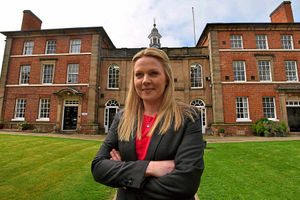Shropshire teacher shortage claim over heavy workloads
Education leaders in Shropshire today warned there was a shortage in teaching staff due to heavy workloads and changing guidelines.

Christine Hargest of Shropshire Teachers' Association revealed that many new teachers were leaving the profession within 10 years due to constant changes within teaching guidelines and inspection criteria as well as uncertainty over the new curriculum.
It comes amid a national crisis with schools facing an unprecedented shortage of teachers in subjects such as geography, religious eduction and foreign languages. Some schools are receiving less than a handful of applicants, a survey suggests.

"Every day is different and exciting" – that is the verdict of a Shropshire teacher on her job.
Charlotte Harman, head of geography at Adams' Grammar School in Newport, said the enthusiasm of her pupils was one of the best parts of her job, and that it was very rewarding to see pupils reach their potential.
But she admitted she understood the pressures felt by teachers which have caused many to walk away form the profession, and said it was a job she could never switch off from out of hours.
She said: She said: "I love teaching, the energy and enthusiasm of my pupils means that every day is different and exciting.
"I can understand why some prospective teachers are put off the profession – there can be a lot of negative publicity and it certainly isn't a 9-5 job. You can't just walk away from school and switch off until the following day, you're always thinking about lessons, wondering whether your pupils are progressing as they should and if there's anything extra you can do.
"The pressure to 'perform' every day in front of a class is tough, you can't ever coast or think 'I'm feeling a little under the weather today so I'll take it easy'. In teaching that isn't an option.
"I still recommend the profession to people who are considering it but they need to be realistic. It's not just a job and prospective teachers need to be prepared for the hard work which comes alongside the rewards of working with young people."
The 32-year-old worked at a school in Stafford before moving back to work in her hometown of Newport two years ago.
She said: "I knew I wanted to be a teacher while I was doing my geography degree at Birmingham University and completed my PGCE at Keele before taking up a teaching position at King Edwards' School in Stafford. I moved from there to Adams' Grammar School in September 2013 and I'm really enjoying my time here.
"When I came for my interview and taught my lesson I knew this was the right school for me as it was one of the best lessons I'd ever experienced. The pupils were engaged and eager to learn and were pushing me to expand on my topic which is really exciting as a teacher.
"I'm from Newport and attended the girls' high school so it's great to return to my home town although I have a passion for travel which I indulge whenever time allows.
"Teaching geography means I can relate many of the topics to my travels which helps bring them alive for my pupils and relates them to real life. I find that boys in particular learn in a very logical way and respond well when they can relate a lesson to a real life example.
"As well as teaching in the classroom I am also a sixth form tutor and deputy head of house. This has enabled me to get to know teachers and pupils in a different way and allowed me to develop my pastoral skills.
More than half of headteachers said they were finding it difficult to recruit in the so called "non-core" subjects, which also include design and technology, business studies and computer science, the Association of School and College Leaders (ASCL), found.
In a survey of 97 headteachers in England, 65 per cent said recruitment was "more difficult" than in past years, and ASCL warned the situation was set to worsen following the drop in graduate numbers caused by rising tuition fees.
ASCL also said that an increasing number of secondary-age pupils was "set to put pressures on the number of teachers needed" and the improvement in the economy would make it harder for schools to compete for talent as potential applicants were lured into other fields.
Ms Hargest, who taught in schools across Shropshire for 40 years, said that while other areas had problems with increasing levels of pupils this was not a problem experienced in the county.
She said: "There is generally a teacher shortage because the job has such a work load impact and the rules and guidelines on what we do keeps changing. New teachers are leaving within 10 years due to the stress of it all.
"There have been so many changes including to GCSEs that still aren't clear, Ofsted guidelines have changed and a new curriculum was brought in from September. There is now a baseline test, which the NUT is opposed to, that has been installed at every section of education.
"Ofsted has changed its guidelines that are now not based on lessons but look at results. The problems with any results is that learning is not a linear process.
"The level system is really not fit for purpose and the new curriculum has no assessment in it, which contradicts with a system that demands assessments. You can't fix education with a knee-jerk reaction and results are not just with the gift of the teacher.
"What they have got to do is to start thinking very carefully about giving teachers professional recognition as it is teachers who know what education is about."
Gary Hickey, headmaster of Adams' Grammar School in Newport, said he had seen a decline in the number of applications submitted for jobs.
He said: "Along with the heads questioned I recognise the shortage the research has uncovered.
"While we do not struggle to fill vacancies we have seen a decline in the numbers of applications we receive.
"There are two important elements to our recruitment policy – recruiting the right staff to begin with and then retaining those staff in the long term. I believe that by offering teachers the opportunities to challenge themselves and to be innovative in the way they teach as well as providing opportunities for teachers to develop their career then we can ensure we recruit and retain the best staff to teach our pupils."
But Gary Wright, head of Adcote School in Little Ness, near Shrewsbury, said the school seemed to be bucking the national trend.
He said they had not experienced a shortage in teaching staff and were "very pleased" with the number of applicants for jobs available from September.
He said: "We have had a number of jobs that we have advertised recently and we are very pleased with the response. We have a very good retention rate of staff and I think it is due to our reputation locally as a school that is making great progress.
"From my point of view, for Adcote this isn't the case but obviously nationally it is looking like a different picture."




